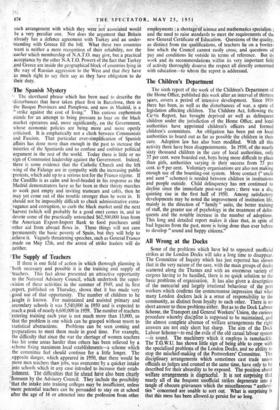The Spanish Mystery
'‘ The shorthand phrase which has been used to describe the I disturbances that have taken place first in Barcelona, then in the Basque Provinces and Pamplona, and now in Madrid, is a "strike against the cost of living." This curious euphemism stands for an attempt to bring pressure to bear on the black market operators and, more significantly, on the Government, whose economic policies are being more and more openly criticised. It is emphatically not a clash between Communists and Fascists. That particular over-simplification of Spanish affairs has done more than enough in the past to increase the 'Miseries of the Spaniards and to confuse and embitter political argument in the rest of the world. Today there is little or no . sign of Communist leadership against the Government. Indeed, there is some evidence that the Catholic Church and the left . wing of the Falange are in sympathy with the increasing public , protests, which add up to a serious test for the Franco regime. If • the Caudillo is as calm and level-headed in his response as the Madrid demonstrators have so far been in their thirsty marches to work past empty and inviting tramcars and cafés, then he may yet come out of this trouble stronger than he went in. It • should not be impossibly difficult to check administrative extra- ' vagance and corruption, to curb the black market until the next "harvest (which will probably be a good one) comes in, and to devote some of the practically untouched $62.500.000 loan from the American Export-Import Bank to food purchases until other aid from abroad flows in. These things will not cure permanently the basic poverty of Spain, but they will help to relieve it. Vaguely threatening speeches, such as General Franco made on May 12th, and the arrest of strike leaders will do neither.


































 Previous page
Previous page